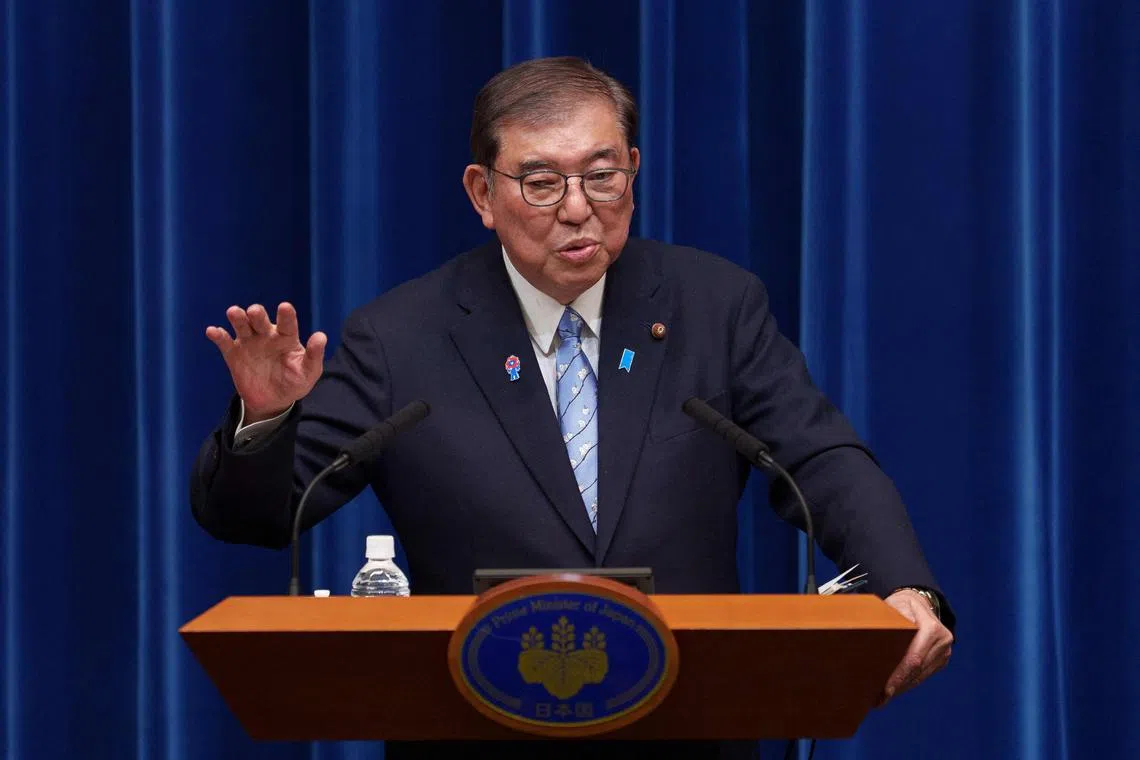Japan PM Ishiba says he and Trump agreed in call to more talks on tariffs
Sign up now: Get ST's newsletters delivered to your inbox

Japanese PM Shigeru Ishiba says President Donald Trump’s decision to slap tariffs on imports from Japan is “extremely disappointing and regrettable”.
PHOTO: AFP
Follow topic:
TOKYO - Japan’s Prime Minister Shigeru Ishiba said he had held a call on April 7 with US President Donald Trump in which they agreed to more talks on the latest US tariffs.
Japanese firms are some of the biggest foreign investors into the United States, but last week, Mr Trump announced a hefty 24 per cent levy on imports from the close US ally as part of global “reciprocal” levies.
“President Trump presented his honest understanding of the current situation of the United States in the international economy,” Mr Ishiba told reporters on April 7 evening after the call.
“Based on today’s exchange... both sides decided to designate Cabinet members to take charge and continue discussions,” he said, without specifying who the ministers would be or when he would next travel to the United States.
“Japan strongly urges the United States to review its measures through these consultations,” Mr Ishiba said, adding that he had told Trump that tariffs would weaken Japanese businesses’ ability to invest in the United States.
He earlier said that Japan would present Mr Trump with a package
He said that this could include Japan’s involvement in a mooted natural gas pipeline project in Alaska.
Mr Trump said in February after talks with Mr Ishiba at the White House that Japan would be a partner in the “gigantic” project.
Mr Ishiba is due to hold a special Cabinet meeting on April 8 morning to discuss how to deal with the tariffs.
Japan’s main index of stocks the Nikkei 225 tumbled almost 8 per cent on April 7 as panicked investors around the world moved into safer assets.
The Japan Business Federation (Keidanren) said on April 7 that the world stands at the “crossroads” on whether free trade can be maintained.
“The world has flourished through the free trade system and free trade since the end of World War II. The driving force behind this system is the United States,” chairman Masakazu Tokura told a press conference.
“The US itself has (now) raised tariffs, and protectionist moves have emerged in response because various countries needed to counteract these moves,” Mr Tokura said.
“To put it in a dramatic way, we hold a sense of urgency that we stand at the crossroads of whether the free trade regime can be maintained,” he said.
Parallel to the 24 per cent tariff on Japanese imports that takes effect this week, Mr Trump has also imposed 25 per cent levies on cars coming into the United States.
In Japan, the auto sector is a major pillar of the world’s fourth-biggest economy, employing about 5.6 million people directly or indirectly.
Vehicles accounted for around 28 per cent of Japan’s 21.3 trillion yen (S$196 billion) of US-bound exports in 2024. AFP

